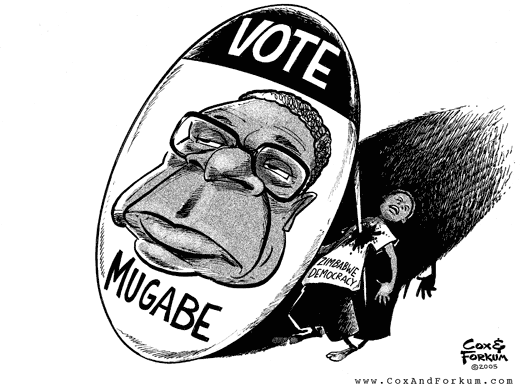Robert Mugabe’s ‘First Toilet’ and The Politics of Other Big Men’s ‘Things’
Published on July 5, 2011 at 1:59 PM by FACE OF MALAWI
 The other week we had that seemingly bizarre story from Zimbabwe. Police Sergeant Alois Mabhuno was jailed for 10 days for using a toilet reserved for President Robert Mugabe. His ordeal didn’t end there, as he was also demoted and banished to a remote rural police post.
The other week we had that seemingly bizarre story from Zimbabwe. Police Sergeant Alois Mabhuno was jailed for 10 days for using a toilet reserved for President Robert Mugabe. His ordeal didn’t end there, as he was also demoted and banished to a remote rural police post.
The story sparked off an avalanche of jokes, but the one that best struck at the meaning of Mabhuno’s misfortune was by a fellow Tweep on the mini-blogging site Twitter.
He wrote of the irony that Mugabe could forgive Zimbabwe Central Bank Governor Gideon Gono for allegedly having an affair with First Lady Grace Mugabe, but couldn’t find it in him to forgive a poor cop who used his toilet.
For the record, Gono and Grace Mugabe flatly denied the allegations that were first reported by South African and British newspapers, then went viral on the Internet like a fire on accelerators.
It’s the gist of Tweep’s remarks, rather than whether Gono and Mrs Mugabe had an improper relationship, which interests us. For it correctly makes the point that in most political societies, particularly developing ones, the trappings and symbols of power often matter more than the unseen but real exercise of power.
Thus to the masses, a president’s signature to authorise the execution of 10 prisoners on death row, which is power over life, is not as impressive as having exclusive use of the First Toilet.
Bob Mugabe ‘Prancing’
The First Toilet is a conspicuous item of privilege, and in a country where millions of people have none and cannot begin to fathom how a man can have an expensive one all to himself, it sets you apart more than some rumour about a governor having an affair with the First Lady. After all, infidelity is common, and even a poor villager will have some experience or knowledge of it.
The Commander-in-Chief’s washroom, on the other hand, belongs up there with other talismans like presidential whisks (Kenya founding Father Jomo Kenyatta’s comes to mind); the presidential staff (the most famous in East Africa being that of Kenya’s former president Daniel arap Moi’s); the Conqueror’s Leopard Cap (Mobutu Sese Seko’s); the VVIP White Handkerchief (former Zambian president Kenneth Kaunda’s); the First Bowler Hat (as with Malawi’s Kamuzu Banda); the list is long.
These props and talismans are much discussed and many ordinary folks will swear that they have magical powers that send conspirators in disarray, wad off assassin’s bullets, and can detect traitors in State House.The power structure in most of our countries is built around this exclusive use and access.
Thus when a president is going to the airport, the road is closed to all other users until he has passed. The president will have his own plate and coffee mug.
His own chef (and here everyone, from the Queen of England to crowd-hugging presidents like America’s Barack Obama, will go on foreign trips with their own cooks). And his own jet, needless to say. Power of course derives from many sources; the vote, the army, control of taxpayers’ money, patronage, to name a few.
But public awe, the perception of how Big a Big Man is, and the fear factor that all men of power need to intimidate competitors, that comes from things like exclusive First Toilets.
[ By: Charles Onyango-Obbo ]